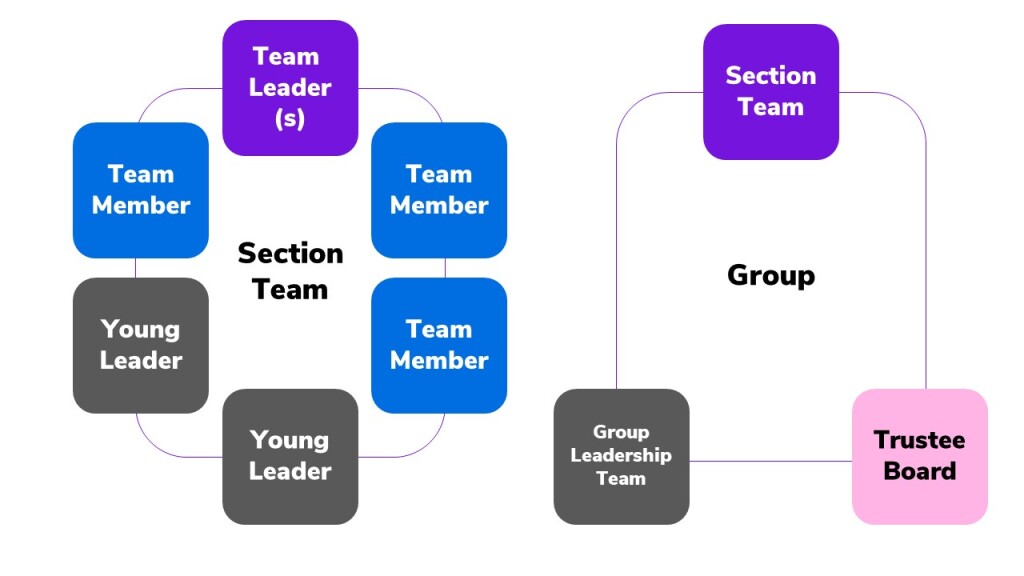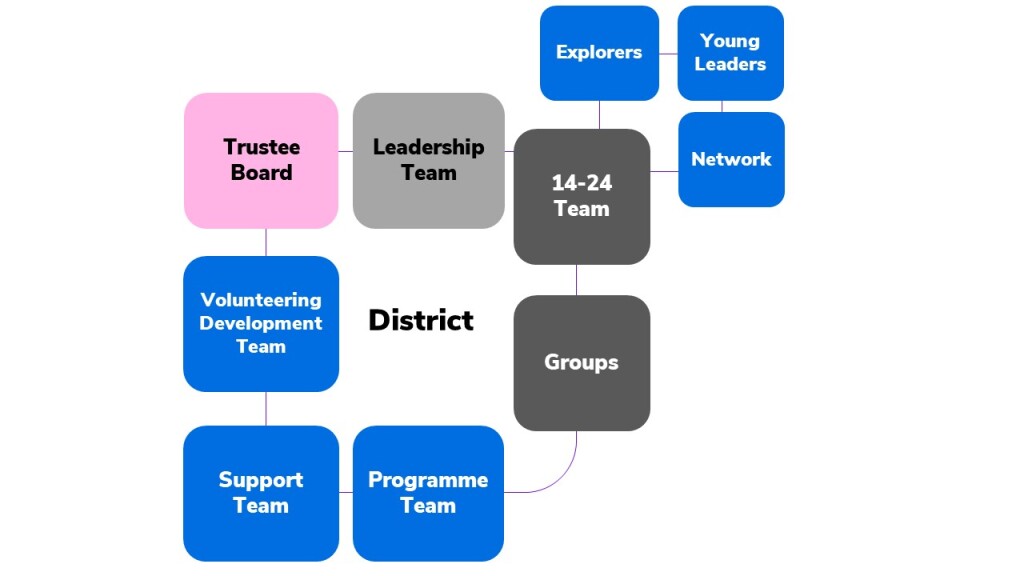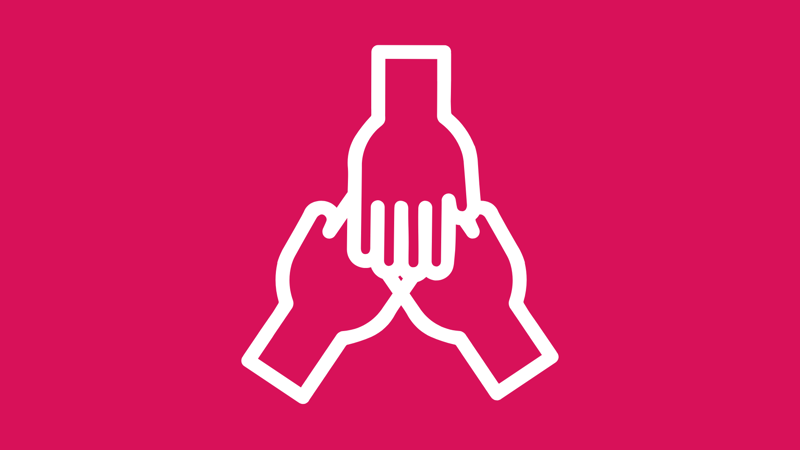In 2024, Scouting is changing to a new approach. We know that sometimes change can be daunting but these changes focus on making Scouts more flexible for Volunteers, easier to understand what teams do, and make it simpler for teams to share tasks and for volunteers to do what they enjoy.
Leeds Templars has already started the transition to the new approach. When the DC torch was passed to Matt in 2023, the all new District Team Leaders were brought in and taught how the new system will work, ready for when Scouts adopts it Nationwide. Here we have put together all the resources you need to find out about the changes and what they mean for you.
Group Changes
At Group level, not much will change from how Groups currently run. The main and most obvious difference will be some name changes and changes to how section teams work. However the old names will still be in use interchangeably as we expect it will take some time for people to get used the changes.
The Group Scout Leader will become Group Scout Lead Volunteer.
Cub Scout Leader will become Cubs Section Team Leader
All former Assistant Section Scout Leaders and Section Assistants will become Section Team Members

Why will there no longer be Assistant Scout Leaders or Section Assistants
All Team members will be required to undergo the same training so everyone will have the same role name. This is to make things simpler for new volunteers and makes it easier for Parents to know who is the leader in charge.
As the new approach is flexible, it will be up to each Section and Group to decide how they want to run things – if you want, there doesn’t need to be any changes besides what goes on compass!
Does this mean that a Section Team Leader won’t have a Second in command?
No. The new system allows for people to be joint Section Team Leaders or to put their own systems in place using Sub-teams.
All leaders will have mandatory Safety, Safeguarding and First aid training.
For example if you want your Beaver Colony to still have a Second in charge person (formally Assistant Beaver Scout Leader) you can still have this in place at your colony as there will be no difference in the training for all Section Team Members.
Sub teams
Sub-teams are a great way of organising our amazing volunteers. These are teams of volunteers that sit within another team. They are not mandatory but give Leaders more options for how they want to run their teams.
Examples:
- Camps Team within a Section Leadership team
- A Fundraising Team within a Group Leadership Team.
- Events Team within the District Programme Team
- Digital Skills within the District Support Team
Why we are creating sub-teams
Within our new approach, we can use sub-teams to:
- Make it easier for Volunteers to do what they enjoy. If you only want to run District Events, you can be a member or leader of an Event sub-team within the District Programme Team. This means you get to enjoy putting on events but don’t have to be involved in programme planning or permit management.
- Increase a sense of identity and belonging within our valued volunteers.
- Make better use of our volunteers’ time and resources.
- Help make it clearer what people do, and what they’re responsible for. For example, you might set up a Climbing Team within the Programme Team. The volunteers in this team could be Climbing Team Leaders and Climbing Team Members.
- Make it easier to find and reach the right people on our digital system. For example, a Cub Section Team Member can find out who the District Hillwalking Team Leader is.
Trustee Boards and Executive Committees
In April 2023, Executive Committees were renamed to Trustee Boards with changes brought from the Charity Commission.
Making the change aligns with guidance from charity regulators and helps Trustee Boards meet their governance responsibilities as charity trustees.
It also aims to help us recruit new volunteers by making roles and responsibilities easier to understand, and helping volunteers to get involved in a way that works for their skills, interests and availability.
Until the new system is launched, Trustee members will still show as Executive Committee Members on Compass.
District Changes
There are a lot more changes at District level than for Groups. We will try our best to make sure that you know how the new teams work and who to talk to for any questions you might have.
Leeds Templars has already planned for and started the move to the new system in Autumn 2023 which means that we are more prepared for the changes to come. You can find out more about the new teams and who is in them in the Our People section of the website
New Teams
District will now have 4 key teams that will work alongside the Group Scout Lead Volunteers, Explorer and Network Leaders.
The Trustee board will be responsible for ensuring that everyone in the District follows POR and is run safely and legally.
GSLs will be responsible for their own Groups but will have input to how the District is run and given the opportunity to voice feedback and new ideas in GSL meetings.

District Leadership Team
This team is made up of the leaders of each of the other District Teams and anyone that the District Lead Scout Volunteer gives a leadership role to outside of these teams, e.g. the Youth Team Leaders and members.
14-24 Team
This team is responsible for all things Explorer, Network, Young Leaders and DofE.
Programme Team
This team is responsible for helping Sections under 14 plan their programmes, planning events, helping people access permits and helping people get permits.
Volunteering Development Team
This team is responsible for helping recruit new volunteers, giving new volunteers a warm welcome and giving volunteers opportunities to access additional training, workshops and more to develop their own skills.
Support Team
This team is a widely varied team that covers fundraising, waiting lists, digital support, websites, providing document templates, building management etc. – anything and everything that helps to make Scouting easier for other volunteers.
Automatic Role changes
Many roles will automatically change e.g. The Youth Commissioner has become the Youth Team lead.
However some roles require a Constructive conversation to determine what team each volunteer would like to be part of.
Scouts Active Support roles and all previous Assistant commissioner roles required a conversation to determine what team they would like to be on as the previous aspects of those roles are now split within the teams.
For example the Assistant Commissioner Scouts could become a Leader in the Programme Team (Scouts), Volunteering Development team for Scout leaders or the Support team and it is up to that person to decide what team they will enjoy the most and how best to make use of their skills. This person can still help another team for projects or events outside of the team they chose.
How to find who to talk to at District
The new District Team names are very simple and normally say what each team will cover. If you are a section leader, you can always discuss any questions with the Programme Team Leader for your section (or 14-24 Team for Explorers/Network) but you can also email any member of the District team and they will be happy to inform you who best to talk to for your questions.

Introduction to changes
What’s Changing
Useful Resources

What this means for Volunteers
What the changes mean
Impact of the changes on roles and teams











